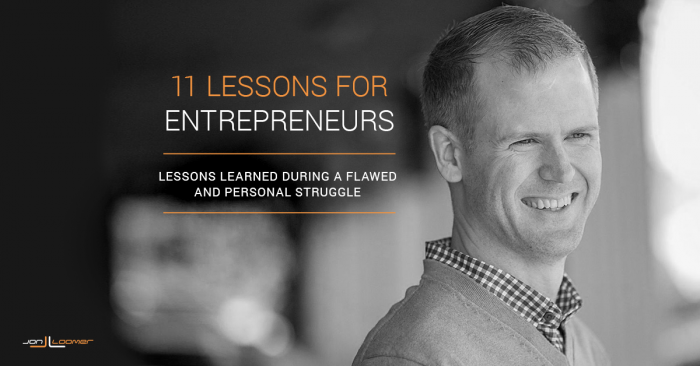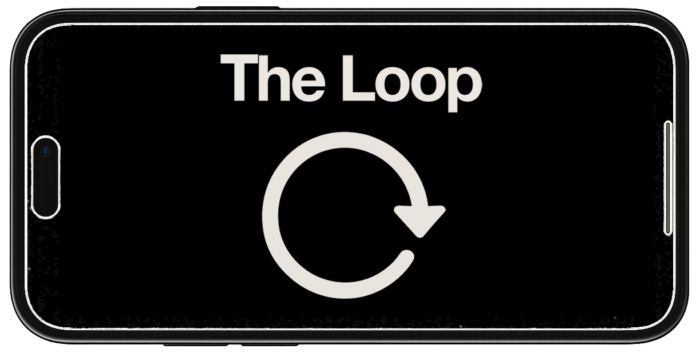
[NOTE: I know I typically fill these pages only with articles and tutorials about Facebook ads. This time, however, I’m taking a slight turn to reflect on entrepreneurship and building a business. If you read carefully, you’ll see how much of this can be applied to Facebook ad strategy. Let me know if this is something you enjoy!]
In August, it’ll be five years since I was laid off for the second time in 2 1/2 years. We’ll reach a landmark anniversary for this website and my “business.”
I use “business” in quotes because it wasn’t a true business in the beginning. It was a concept without a blueprint. It was a website without a content plan. It was a brand without a logo. And it was a business without revenue.
I’ve achieved a certain level of success now, and it’s laughable to me as I look back on it all. I certainly wasn’t an instant success. I doubted myself. I was depressed. I made no money. I had no freaking clue what I was doing.
I didn’t even call it a business in the early going. When I told people what I was up to with my website, I said it was a way to show potential employers what I could do. And what could I do? I certainly couldn’t start my own business.
But things evolved. I was picky. I refused to relocate my family (again). I refused to apply for jobs that I wouldn’t be passionate about. And maybe it could be perceived as lazy, but I refused to settle for a simple paycheck.
Meanwhile, I was a man desperate to provide for a family of five. As the only source of income, I felt the pressure of making enough money to not only keep a new roof over our heads but allow my wife the freedom to continue to be active in our boys’ schools. I yearned for the flexibility that would allow me to see my kids grow up and to coach their baseball teams.
I’d love to say I was focused, prepared and an instant success. I experimented and I failed. I went through inconsistent periods of exhaustive work and lazy uncertainty. I listened to people when I should have ignored them. And I found motivation by constant rejection.
It was nearly a year until I created my first product. I had no idea where to start. I didn’t know how to launch. I didn’t know the technology behind it. And despite the hours of reading I devoted to entrepreneurial websites (I had the time to read!), I had no confidence that I could pull it off myself.
Eventually, I ignored the need to create something polished, and I sent an email to fewer than 5,000 people. It sent them to a basic landing page with an idea and a PayPal button.
There was no product (yet). But based on the response (or lack thereof), I would create something.
That “something” ended up being my first training course. It was basic and understated technologically, but it also overserved and offered significant value. It showed me what was possible.
During my time since, I’ve learned many lessons. These lessons apply to starting a business, but they also apply to many facets in life — whether it be finding success with Facebook ads, building a happy marriage or motivating young kids as a baseball coach (hey, I speak from what I know!).
Let’s take a closer look at a few of those lessons…
1. Successful People Are Not Idols
Holy crap, man, they’re just people.
I get it, though. In the early part of my business, I idolized those who figured it out — or at least made us all think that they figured it out. But as the years have passed, I’ve had the surreal experience of those roles being shifted.
The people I was looking up to five years ago were just people. They were at a different stage. They had failed and succeeded and found a way to get me to listen to them. But their experiences were simply their own — personal and flawed.
I do not understand the idolization of entrepreneurs who have attained success. In many cases, they are merely coasting now. You may think that they offer words of wisdom, but the truth is that most of the value they can offer is in the struggle that is no longer there.
The true success is getting out of the hole when no one knows who you are. When you have nothing. When you have everything to lose.
Once you’ve built a name and a reputation, you have equity. You can risk big and fail behind the scenes. You can pay people to do the heavy lifting while you’re drinking Mai Tais on the beach.
You’ll hear a lot about the “hustle,” but the truth is that the hardest work for these people has already been completed. Perspective has likely been lost, and much of the strategies they apply today aren’t applicable to your life.
I’m not saying that you shouldn’t listen and research and learn from those who have found success. But do not treat those stories as having more value than your own. Learn from all stories equally.
2. Follow Those You Trust and Be Someone Who Can Be Trusted
When you lack confidence, you are vulnerable. When you’re vulnerable, you’re bound to listen to people you shouldn’t.
There is a lot of trash out there, people. You need to sort through it.
If you apply the recommendations of a person you don’t trust, you become the type of person who can’t be trusted. Someone else is looking for advice from you, just as you are looking for advice from others.
I don’t mean to make this about morals, but you need to decide the difference between right and wrong. You need to know where the line is drawn. And when unsure, err on the side of caution.
Ultimately, people are looking for others they can trust. They won’t follow your advice or buy your product otherwise. Allow that trust to guide you.
3. Do Not Follow a Beaten Path
I still struggle to figure out why and how I was able to make my business work, but my theory is that it is related to a decision to do things my way.
I had no confidence early. I did what I’m sure most people do. I read the words of the successful and attempted to apply their recommendations. It was often flawed and wrong.
Don’t try to be the next Seth Godin. Or Chris Brogan. Or Marcus Sheridan. Or Mari Smith.
Their paths are not templates to follow. There can be only one of them. And what they accomplished was under conditions unique to their lives and a different time.
Maybe doing what others tell you to do is a good way to start — it’s certainly what I did in the early going. It certainly wasn’t how I found success, though.
Success is found when you do things in ways that haven’t been done before — or at least, not intentionally copying the paths of others.
I’m happiest when I create something of my own. When I do it my own way. When I feel as though my brand is stamped on an experience in a way that hasn’t been stamped by others.
My goal is to help you find success — not by showing you how to do it my way (something that may not work for you), but to give you the tools that might help you answer your own questions.
Create something that is uniquely you that can’t be confused for someone else’s.
4. Do Not Look for Shortcuts
“The simple system for five cent conversions.”
“The blueprint for generating six figures in six months.”
Screw all that noise, man…
I get so many questions from people who look for shortcuts. They want the cheapest likes, the cheapest leads or the cheapest conversions. They look for weaknesses in an algorithm or ways to game a system.
Do not look for shortcuts. No sustainable, long-term success comes from it. Shortcuts are not a source of pride.
If someone comes to you looking for a shortcut, send them away. They expect results from a universally applicable and easy strategy that does not exist. They will only be disappointed.
Value the hard work, but also put value in knowing that there is not always (or possibly ever) an easy solution.
5. Create Solutions Instead of Applying “Tricks” and “Secrets”
Keep it going…
If your business is built on templates and tricks and secrets, it is unlikely to find any success. If it does, it will not last.
Your purpose should be to create solutions. Someone doesn’t have the answer? There isn’t a software that solves your problem? Create it — whether it be a workaround or a new software entirely.
Don’t always use tools in ways they are intended to be used. Look outside of the box. Be a problem solver instead of looking for others — people or products — to solve your problems for you.
6. Don’t Be a Click Bait Monkey
Click bait “works,” right?? I know, we’ve all experimented with it.
But click bait is the greatest fraud of them all. It’s knowingly misleading people into believing that more value exists on the other side.
Just stop…
Click bait headlines have watered down the meaning of “shocking.” It now means “boring, not that interesting and pretty much what you expected.”
So if you live off of click bait, you’ll find some initial success. But eventually, your audience will stop taking your shocking headlines seriously. And even when you do have big news, it won’t be believed.
7. Build for the Long Term
Along these lines, your business and your brand are more than the immediate click and dollar. So it’s important that you play the long game, or you won’t have a business next year.
Make decisions based not on how it impacts your business today, but how it will help you grow to the business you want next year and five years from now.
Don’t worry so much about the volume of customers, but building a pack of quality, raving, loyal fans who will buy from you over and over again.
While living in the “now” is a great motto for life, plan your business for tomorrow. It really doesn’t matter how much success you had today.
8. Find Motivation Greater Than Money
Look, I’m sure some people who are motivated only by money are able to find happiness. But I can’t help but feel that’s an empty existence.
I have three sons. As I write this, I have 10 years remaining with them in my home. And that is freaking depressing.
I’m surely not going to waste these 10 years at my computer. I won’t turn down an invitation for a catch in the backyard because I have too much “hustle” to accomplish today. I won’t waste a week on the road to make sure we have a BMW instead of a minivan.
You’ve got to have other reasons for why you do what you do.
My business eventually worked, and I’m convinced it’s due to desperation and perspective. Our oldest son is a cancer survivor. I care about every moment I spend with my boys.
So my “big why” is my boys and my wife. I care more about the little moments than I do the keynote spotlight on a stage. I’d rather spend an afternoon coaching my son’s baseball team the fundamentals of hitting than a Fortune 500 company the fundamentals of the Facebook ad.
While we still need to pay the bills, I value time more than I do the dollar. I value experiences more than I do contracts.
Of course, that doesn’t need to be your motivation. But find what motivates you, and be sure it goes deeper than “getting rich.”
9. Admit When You’re Wrong or You Don’t Know
I’m asked for advice often related to Facebook ads. My most common response: “I don’t know. Experiment and find what works for you.”
It’s not a cop out. It’s an understanding that there is no universal answer for everyone. And it’s self awareness that I don’t know everything — and I’m often wrong.
How I created my business is probably wrong for most people. How I run my Facebook ads may be wrong for many businesses. But I experimented and found what worked for me.
If someone acts like they definitively know all of the answers, do not trust their advice. Instead, listen to those who guide you to allow you to find the answer yourself.
I’ve screwed up a lot, and I’m proud to admit it. Know that you aren’t perfect either, and you’ll never find success without failing a whole bunch of times.
10. Say “No” — A LOT
There was a time when I only knew how to say “yes.”
You want me to do a whole lot of custom work for you for not a lot of money? You’ve got it! You want me to reschedule my Wednesday to get on a call with you and hear about your product? Why not?
While saying yes constantly gave me a sense of being needed, it also is an easy way to devalue yourself. It wasn’t until I started saying “no” — a lot — that I found liberation.
It’s really — REALLY — hard to get me to commit to something that is outside of my routine these days. And I feel damn good about it.
One of the greatest pieces of advice I ever received came from my now business manager and backup CEO John Robinson. I had a contract sitting on my desk — a three inch stack of papers — waiting to be signed that would allow me to write my first book. I was going to sign it, but then he said…
Ask yourself: Does the thought of doing this energize you?
Hell no, it didn’t! I thought about the deadlines and the long hours and the editing and the fact that whatever I wrote would no longer be relevant in a year. That was not energizing!
I turned down that deal. It was a major turning point in my business.
11. Some Guilt is Healthy, but Live Shamelessly
I’ve wasted too many hours feeling shame for not living up to a standard I think others expect. I see others who are more successful and assume I need to do better. I feel shame for not working around the clock, hustling late night and on weekends.
I’ve learned that some guilt is healthy. If I veer too far from my routine, I can get lazy. It’s the trap of an entrepreneur. It’s that guilt that keeps me in line.
But I’ve vowed to no longer feel shame for enjoying the moment. I don’t desire to live the day in exhaustion. It’s okay to rest, to breathe, to walk aimlessly and enjoy my day. It’s okay to do “nothing” from time to time.
Procrastination is not always a bad habit. Instead of being in a constant state of disappointment regarding my inability to get things done early, I’ve learned the art of productive procrastination. It’s no longer a source of stress.
Don’t allow the sleepless obsession of others to shame you into doing the same. Live your life shamelessly!
Your Turn
These are 11 primary lessons I’ve learned during the past five years, but I could go on. Anything you’d add?
Let me know in the comments below!







